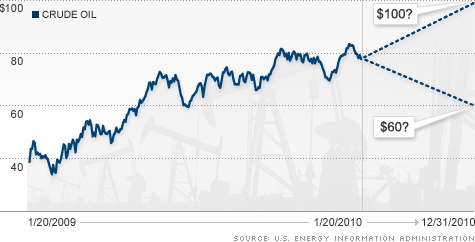 Source
SourceNEW YORK (CNNMoney.com) -- Two very different views on where oil prices are going by the year's end are emerging - one says $60 or lower, the other $100 or higher, and there's little consensus as to which is right.
The bulls say stronger global economic growth and low interest rates will lead to higher demand, pushing prices up from their current level of around $75 a barrel.
The bears say a rising dollar, weaker economic growth and greater efficiency will cause oil prices to fall as the year progresses.
"It underscores the volatility of the market and the various assumptions about the economy," said Antoine Halff, Deputy Head of Research, Americas, Newedge USA, a joint venture brokerage subsidiary of Calyon and Societe Generale.
It's easy to imagine higher prices, especially as we've seen oil spike to over $140 a barrel just 18 months ago.
Most arguments for rising prices center around predictions for strong economic growth.
Merrill Lynch assumes a fairly robust global economic growth rate of 4.4% in 2010 and 4.5% in 2011. Merrill's views on the economy, and oil prices, are similar to those at Goldman Sachs and Barclays.
The bank also feels interest rates will remain low. That means more liquidity and faster growth in the developing world, said Francisco Blanch, head of global commodities research at Merrill. To a lesser extent, it could also lead to more investment interest in commodities.
"As the private sector resumes its role as an engine of global growth in the second half of 2010, we see oil prices averaging $92 a barrel and potentially breaking through $100 a barrel as we enter 2011," Blanch wrote in a recent research note.
Yet other big banks have a very different view.
Analysts at Deutsche Bank's commodities unit average various economic growth forecasts to arrive at a rate of 3.2% - lower than Merrill's 4.4%.
Deutsche feels the threat of rising interest rates will lift the dollar, causing oil prices to fall. The bank has also argued in previous reports that efficiency gains made over the last few years will dampen oil demand, even when the economy expands.
The bank is predicting prices in the last quarter of the year will average $60 a barrel. While prices will steadily rise after that, the bank doesn't expect prices to average over $100 a barrel until 2015.
"We remain cautious about the oil price outlook for 2010," Adam Sieminski, chief energy economist at Deutsche, wrote in a recent research note. "The markets remain delicately balanced, we expect some weakness"
The bank throws in another wild card: OPEC. Not wanting to kill budding economic growth, Deutsche feels OPEC - particularly Saudi Arabia - will use its vast supply of oil-in-reserve to thwart sustained prices above $75 a barrel.
That's not a view shared by the oil bulls.
"We've seen oil at $84 a barrel and OPEC hasn't blinked," said Merrill's Blanch.
Asking other analysts who's right is of little value - there seems to be no collective reasoning.
Newedge's Halff thinks prices will end the year closer to $100, but not for the same reasons Merrill does.
He believes Deutsche Bank's theories on the economy and efficiency, but thinks the Iran factor hasn't been priced in.
Halff thinks no deal will be reached over its nuclear program, which will cause oil prices to rise over fear of a military strike.
The U.S. Energy Information Administration is taking a more middle-of-the-road approach, calling for oil in the low $80s by year's end.
EIA also assumes a lower level of economic growth, and thinks OPEC will act to keep prices down.
EIA senior economist Tancred Lidderedale said it's not all that uncommon for two different oil analysts to have oil prices going in completely opposite directions.
To underscore the uncertainty in the market, he said analysts can only say with 95% confidence that oil will be somewhere between $46 a barrel and $162 a barrel by the year's end.
Gold, anyone?===> Click
BACK TO CHAT BOX
.png)



No comments:
Post a Comment